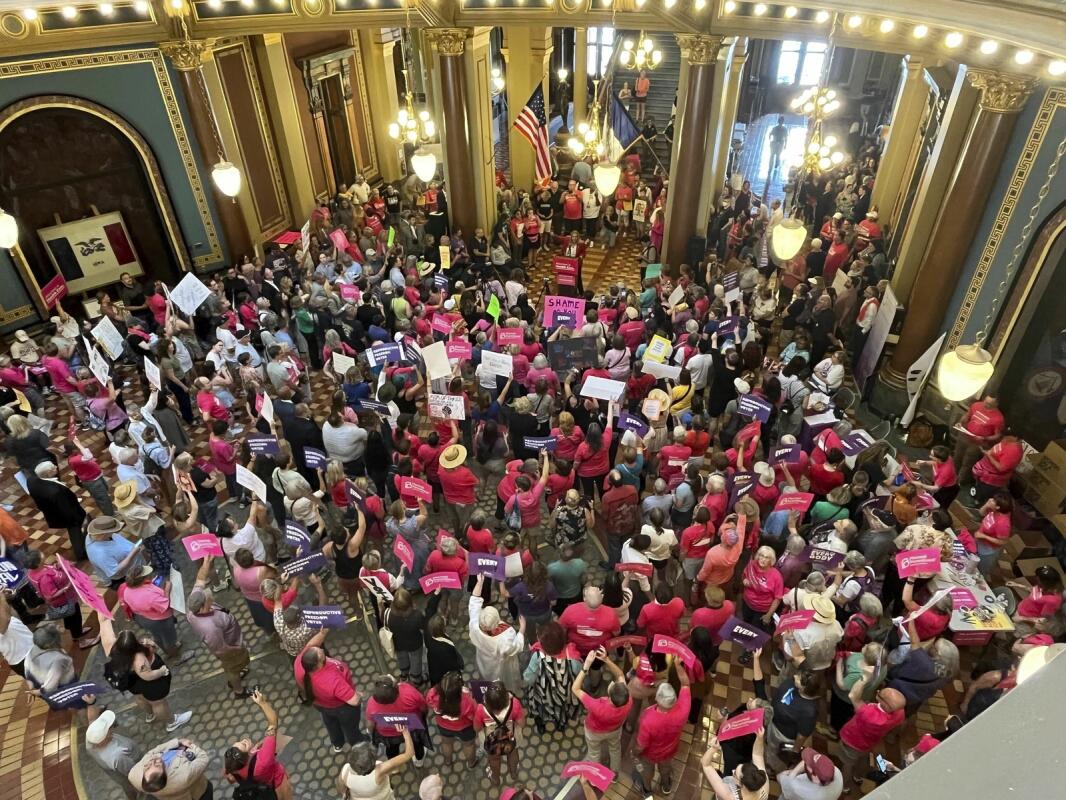During this past week’s special legislative session, the number 61 was heard often.
That’s the percentage of Iowans surveyed in a March Des Moines Register Iowa Poll who said abortion should remain legal in all or most cases. As the battle over a Republican-backed abortion ban raged in the Statehouse rotunda, in committee rooms and on the House and Senate floor, Democrats and their pro-choice allies were incredulous in the face of a Republican majority willing to pass legislation that so few Iowans appeared to favor.
And it’s not the first time. Earlier this year, Republicans pushed ahead with legislation to create publicly funded Education Savings Accounts to help pay for private schooling despite the fact polls have shown the idea is unpopular among Iowans. The same Iowa Poll, taken after the bill was signed into law, showed 62 percent oppose the plan. A March 2022 poll showed 52 percent of Iowans in opposition.
Seventy-eight percent of Iowans polled oppose using eminent domain to take land for carbon pipelines. And yet, the Iowa Senate killed legislation that would have restricted the use of eminent domain for pipeline projects. Lawmakers adjourned without addressing the issue.
So what gives? How do Republicans continue to amass more and more power under the Golden Dome of Wisdom even as they approve policy Iowans don’t favor?
Maybe voters simply don’t pay attention to policy and don’t think much about it when they enter a voting booth. Or maybe they care more about day-to-day issues such as inflation. Perhaps Democrats have failed to sell themselves as a compelling alternative. Iowans who say they oppose these measures may not feel strongly enough about them to change their votes.
Your guess is as good as mine. So I went to the internet, seeking clarity. Yeah, I know.
There I found a 2020 study published in Perspectives on Politics written by Adam Cayton, a professor of government at West Florida University, and Ryan Dawkins, a professor of political science at Carleton College in Minnesota. Dawkins previously taught at Grinnell College.
They dug into public opinion data and roll call votes from the Cooperative Congressional Election Study for members of Congress from 2008-2014. They looked at data indicating whether voters are motivated by policy-specific preferences or identity-based, symbolic preferences.
Newsletter Signup
 Delivered to your inbox daily
Delivered to your inbox daily
What they found is Democrats are more likely to punish candidates for taking policy positions they disagree with. Republicans are much less likely to do so.
“Republican lawmakers are more likely than Democrats to cast roll-call votes that are incongruent with district opinion on high-profile policy issues because their constituents often value symbolic loyalty to “conservatism” more than they care about the content of the public policy being advanced, while the opposite is true for Democratic lawmakers,” Cayton and Dawkins wrote.
“Republicans are more likely than Democrats to approve of representatives who vote in line with their ideological identity, even if they sometimes vote against their preferred policy outcome. In other words, Republican identifiers reward support for in-group loyalty to the conservative team but Democratic identifiers reward support for their individual policy positions,” they wrote.
So right-leaning voters are more likely to stick with Republicans even if they ban abortion, spend public money on private schools and permit taking land for pipelines. Their conservative identity trumps policy outcomes, even if they oppose those outcomes.
“The disconnect results from the fact that while a majority of the American public embraces a conservative social identity, only about one-third consistently endorse conservative policy positions. By contrast, a large majority of the American public endorses liberal policy positions but only about one-third identifies as liberal,” Cayton and Dawkins wrote.
In the Iowa Poll, 35 percent of voters said abortion should be illegal in most cases. Thirty-four percent approved of Education Savings Accounts.
So Republicans can approve policy supported by their most ardent supporters and not worry about alienating their broader base of support.
In an October 2022 Iowa Poll, right before the midterms, 33 percent of Iowans who planned to vote for Reynolds also supported legal abortion. That’s despite the fact Reynolds clearly campaigned on severely restricting abortion access.
Enlightening, and frustrating, if true. It’s one study and one set of polling.
But this incongruence can be seen easily on the campaign trail.
Democrats are out there campaigning against all the lousy legislation approved by Republicans and on policy proposals they argue would be better. Republicans are campaigning on the notion that Democrats are dangerous woke socialists, public schools are liberal indoctrination centers, school libraries are full of pornography and transgender kids are a menace to society.
It’s public policy vs. potent, albeit dishonest, symbolism. And in Iowa, the symbolism is winning as the state becomes redder and redder.
That doesn’t bode well for Democrats’ comeback chances. That said, the sheer volume of unpopular actions and inactions during the past legislative session could reach a critical mass. Overreach still can hurt Republicans in 2024, especially among independents who decide there should be a check on what they may see as the reckless use of state power. Women who lost their reproductive rights are unlikely to forgive and forget July 2023.
When Iowans see the real effects of these unpopular policies, they may decide that harmful laws trump symbolism. Maybe even 61 percent of them.
(319) 398-8262; todd.dorman@thegazette.com

 www.thegazette.com
www.thegazette.com
That’s the percentage of Iowans surveyed in a March Des Moines Register Iowa Poll who said abortion should remain legal in all or most cases. As the battle over a Republican-backed abortion ban raged in the Statehouse rotunda, in committee rooms and on the House and Senate floor, Democrats and their pro-choice allies were incredulous in the face of a Republican majority willing to pass legislation that so few Iowans appeared to favor.
And it’s not the first time. Earlier this year, Republicans pushed ahead with legislation to create publicly funded Education Savings Accounts to help pay for private schooling despite the fact polls have shown the idea is unpopular among Iowans. The same Iowa Poll, taken after the bill was signed into law, showed 62 percent oppose the plan. A March 2022 poll showed 52 percent of Iowans in opposition.
Seventy-eight percent of Iowans polled oppose using eminent domain to take land for carbon pipelines. And yet, the Iowa Senate killed legislation that would have restricted the use of eminent domain for pipeline projects. Lawmakers adjourned without addressing the issue.
So what gives? How do Republicans continue to amass more and more power under the Golden Dome of Wisdom even as they approve policy Iowans don’t favor?
Maybe voters simply don’t pay attention to policy and don’t think much about it when they enter a voting booth. Or maybe they care more about day-to-day issues such as inflation. Perhaps Democrats have failed to sell themselves as a compelling alternative. Iowans who say they oppose these measures may not feel strongly enough about them to change their votes.
Your guess is as good as mine. So I went to the internet, seeking clarity. Yeah, I know.
There I found a 2020 study published in Perspectives on Politics written by Adam Cayton, a professor of government at West Florida University, and Ryan Dawkins, a professor of political science at Carleton College in Minnesota. Dawkins previously taught at Grinnell College.
They dug into public opinion data and roll call votes from the Cooperative Congressional Election Study for members of Congress from 2008-2014. They looked at data indicating whether voters are motivated by policy-specific preferences or identity-based, symbolic preferences.
Opinion Newsletter Signup
Newsletter Signup

What they found is Democrats are more likely to punish candidates for taking policy positions they disagree with. Republicans are much less likely to do so.
“Republican lawmakers are more likely than Democrats to cast roll-call votes that are incongruent with district opinion on high-profile policy issues because their constituents often value symbolic loyalty to “conservatism” more than they care about the content of the public policy being advanced, while the opposite is true for Democratic lawmakers,” Cayton and Dawkins wrote.
“Republicans are more likely than Democrats to approve of representatives who vote in line with their ideological identity, even if they sometimes vote against their preferred policy outcome. In other words, Republican identifiers reward support for in-group loyalty to the conservative team but Democratic identifiers reward support for their individual policy positions,” they wrote.
So right-leaning voters are more likely to stick with Republicans even if they ban abortion, spend public money on private schools and permit taking land for pipelines. Their conservative identity trumps policy outcomes, even if they oppose those outcomes.
“The disconnect results from the fact that while a majority of the American public embraces a conservative social identity, only about one-third consistently endorse conservative policy positions. By contrast, a large majority of the American public endorses liberal policy positions but only about one-third identifies as liberal,” Cayton and Dawkins wrote.
In the Iowa Poll, 35 percent of voters said abortion should be illegal in most cases. Thirty-four percent approved of Education Savings Accounts.
So Republicans can approve policy supported by their most ardent supporters and not worry about alienating their broader base of support.
In an October 2022 Iowa Poll, right before the midterms, 33 percent of Iowans who planned to vote for Reynolds also supported legal abortion. That’s despite the fact Reynolds clearly campaigned on severely restricting abortion access.
Enlightening, and frustrating, if true. It’s one study and one set of polling.
But this incongruence can be seen easily on the campaign trail.
Democrats are out there campaigning against all the lousy legislation approved by Republicans and on policy proposals they argue would be better. Republicans are campaigning on the notion that Democrats are dangerous woke socialists, public schools are liberal indoctrination centers, school libraries are full of pornography and transgender kids are a menace to society.
It’s public policy vs. potent, albeit dishonest, symbolism. And in Iowa, the symbolism is winning as the state becomes redder and redder.
That doesn’t bode well for Democrats’ comeback chances. That said, the sheer volume of unpopular actions and inactions during the past legislative session could reach a critical mass. Overreach still can hurt Republicans in 2024, especially among independents who decide there should be a check on what they may see as the reckless use of state power. Women who lost their reproductive rights are unlikely to forgive and forget July 2023.
When Iowans see the real effects of these unpopular policies, they may decide that harmful laws trump symbolism. Maybe even 61 percent of them.
(319) 398-8262; todd.dorman@thegazette.com
Opinion: Why do Iowa Republicans get away with passing unpopular laws?
Iowa Democrat Jennifer Konfrst speaks to protesters rallying at the Iowa Capitol rotunda in opposition to the new ban on …


